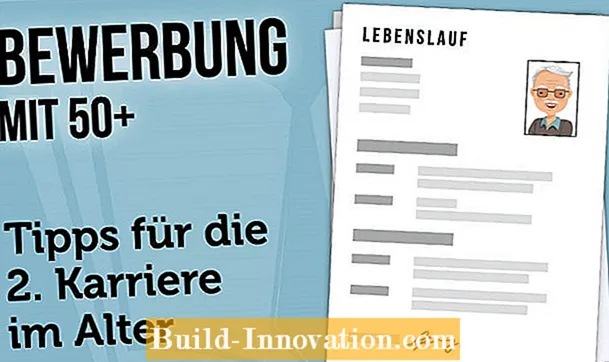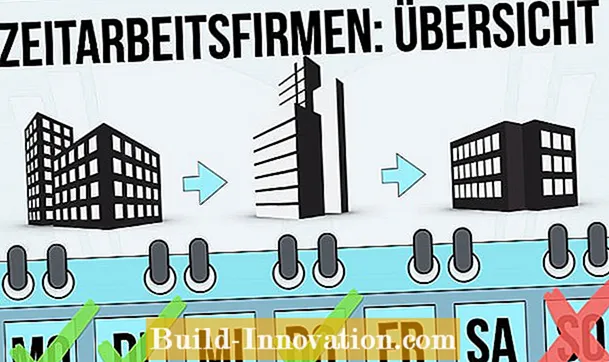Job interview: tips for shy people

Content
- What does it mean to be shy?
- This is how shy people score in an interview
- What do HR managers look out for?
- competence
- team spirit
- added value
- What is convincing: HOW do you work?
- Shy in the interview? Simple tips
- 1st step: feel good
- Step 2: calm down
- Step 3: Allow
- 4th step: Present
Being shy could also be seen as charming restraint. Such a person is not a loudspeaker or poltergeist, but a discreet listener and sensitive companion. In the interview, however, attitude can become a problem. Shy applicants score less often and are often left behind when it comes to selecting applicants. Especially small talk and self-presentation in the job interview cause you problems. You can still shine - we'll show you how and give you tips on how shy people can convince HR managers in job interviews ...
What does it mean to be shy?
There is a beautiful parable that amusingly illustrates the nature of shyness. It is the story of a shy woman who enters an elevator with a lift boy. The lift boy asks dutifully: “Which floor?” Then the woman quietly: “7. Stock - but only if it is not a detour for you. "
To be shy meanshaving greater shame in front of other people than normal. This is not a disease, but a trained behavior. Many shy people suffer from an exaggerated, almost self-torturing self-perception: Everything they want to say or do, they subject to a prior censorship - how it might affect others or how they compare with others. In the extreme, this can lead to a veritable fear of approaching others or of having to approach them. Like in an interview.
In contrast to the two personality traits - introversion and extraversion - shy people are somewhere in between. You may want contact with people like extroverts, but like introverts it is difficult for them to get out of their own shell.

This is how shy people score in an interview
Nervousness before and during the interview is completely normal. She meets all applicants. Those who strive for perfection here only block themselves additionally. HR professionals expect authentic candidates with character and skills in job interviews - not super men or power women optimized in the wind tunnel. In fact, it would be harmful if you tried to play a role or live up to expectations.
Make yourself aware: You have been invited to an interview. That is a compliment. Your application documents - cover letter and résumé - were convincing. The experience and qualifications match the position - and they want to get to know you better now.
In other words, you were invited to an interview because of the skills you have - not the skills you lack. So stand by yourself and your shyness. That's only a handicap if you make it into it!
What do HR managers look out for?
In theory, there are many questions HR professionals can ask. Also nasty trick questions or stress questions. But they are not meant as mean as they feel. At its core, HR professionals are always concerned with the following selection criteria:
-
competence
HR professionals want to check whether you really have the skills stated in your CV and cover letter. This is how they want to make sure that you are up to the challenges of the job. You can jump over the hurdle by providing examples and stories from previous jobs that demonstrate your working methods. Your attitude: you can do it!
-
team spirit
You could also say: HR managers want to know whether the proverbial chemistry is right. Will you fit into the existing team - or seriously disrupt the company culture? It is true that lateral thinkers and creative minds are the humus on which innovations thrive. In fact, HR managers - unfortunately - tend to pay attention to conformity. Your job chances increase significantly the more you find and emphasize similarities.
-
added value
Finally, HR managers pay attention to the added value that a new employee can create.So it's about how you want to use your experience and qualifications in the new job. Make a few thoughts in advance and present them briefly (!). By the way, it doesn't matter if you're right. What matters is your goal orientation and the commitment you show.
What is convincing: HOW do you work?
The thought is unusual, provocative, but worth considering: Suppose you are a recruiter and are looking for talent. Then you would probably hire applicants less for WHAT they do and more for HOW they do it. After all, the finalists in the interview all have something in common: They have already proven in writing that they can theoretically do the job. The icing on the cake is the right work style, the HOW. This is exactly what makes you unique - even shy people.
When you tell people HOW to do their job, one takes away their identity and degrades them to recipients of orders or dumb work machines. The WIE reveals the diversity of the workforce and individual talent. In the job interview, therefore, do not string together any professional stations (WHAT?), But tell examples that deal with HOW you cope with your tasks - and you increase your application chances.
Shy in the interview? Simple tips
You can answer most applicant questions, whether you are shy or not. Thorough preparation is the be-all and end-all, because it gives you more security. The following steps are particularly suitable for shy people ...
1st step: feel good
Shy people feel uncomfortable with strangers. The unfamiliar environment comes into play during the interview. That makes things even more insecure. You cannot influence the environment. But probably your own feel-good factor.
- Outfit
It starts with the clothes in the interview. Wear what is comfortable and still fits the target industry and position. In any case, no disguise! - posture
Sit upright, shoulders straight, neck straight - smile! Shy people find it difficult to maintain eye contact. With this body language and posture, however, you automatically gain more self-confidence. - hands
Small micro-gestures reveal how we feel. Fiddling with your fingers, twisting rings or constantly plucking your hair - that reveals great uncertainty and nervousness. Prevent this by placing your hands in your lap or on the table - palms up. That signals openness.
Step 2: calm down
The tension just shows that the job is important to you. If the heart is beating up to the neck and the pulse is pounding, there is a risk of a panic attack or even a blackout. Nervousness can be contained by calming down and putting the situation into perspective.
- getting there
You can reduce stress with very simple means: Arrive earlier, plan travel routes, as well as alternative routes due to traffic jams. Most of all, stress is a physical reaction. It can also be easily lowered: Park further away and walk a little to the company. Or take a quick walk around the block beforehand. Ten minutes of buffer are absolutely sufficient. - offer
You have already cleared the first hurdle. They have something to offer and therefore don't need to be small. Here and now you do not appear as supplicants, but have brought with you a top offer: yourself! The interview is also used to find out whether YOU actually want the job. Could also turn out to be an aerial number. If you reflect on your strengths, the pressure drops. - Alternatives
If it doesn't work out here: Other stores have nice jobs too. Do not believe the chance is a one-off. She is not! Only in retrospect do we often realize that the rejection has opened the way to something better. Instead of worrying, consider the conversation one of several options.
Step 3: Allow
The whole interview situation is as refreshing for shy people as flipping through it. We understand. But it doesn't get any better if you keep repeating this to yourself. The world doesn't end if you don't know the right answer or if your voice fails. That only makes you human and authentic. Get involved in the conversation - and turn it into a dialogue, not an interrogation.
- To listen
If you don't like to talk, you can just listen. And asking questions - this is called “active listening”. Occasional silence is not a shame either. Nor is it a mistake to ask questions of understanding. Not only are you shy, but you are also conscientious. Class! - Verbalize
Miming the strong man or the strong woman? Not a good idea! Studies show: Emotional suppressors reduce their job opportunities. They are perceived as artificial, cold or too stiff. So if you have said something stupid or don't know what to do next: say that. Just saying it defuses the situation noticeably. Verbalizing your thoughts may make you more vulnerable. For many, however, a kind of bite inhibition sets in immediately. You see the person now, not the answer. - Breathe
Nervousness affects breathing. Many people then tend to shallow chest breathing. Effect: The mouth becomes dry, the voice becomes squeaky. Conscious breathing into the stomach helps to release the tension. Try to breathe deeply into your stomach again and again during the breaks. That relaxes immediately.
4th step: Present
If you have implemented everything up to this point, you are ready for the self-presentation (also called "self-introduction"). It is part of the regular repertoire in the application process. At some point the sentence comes up: "Tell me something about yourself!" A classic. And the prelude to your performance. The self-presentation rarely takes longer than two to five minutes. More is not expected either.
This short elevator pitch to you you can practice perfectly at home so that you can speak it freely later. Reading is taboo! The self-introduction is ALWAYS a free lecture. That sounds difficult, but it can be trained. Ideally, follow this choreography:
1. Career ("I am ...")
- Self-introduction (name, age, origin)
- Apprenticeship, studies, highest degree
- Previous jobs, experiences
Successes ("I can ...")
- Milestones in professional life
- Special qualifications, certificates
- Relevant soft skills
- Greatest Successes (Numbers!)
Relation to the position ("I will ...")
- Use of strengths and talents
- Value that you want to create
- Motivation for the job
Rehearse the self-presentation repeatedly at home in front of the mirror or as a video recording with the smartphone. Those who are more self-confident can also practice this in front of real listeners, such as friends, siblings, parents. Advantage: They give you feedback and tips on how you work and what can be improved.
Shy? You can be. But you don't have to. Especially not in the interview. With the tips and four steps mentioned, you will immediately appear more confident. As long as you don't apply for a job as a stage rock star, that's fine. Take courage! We wish: good luck!



